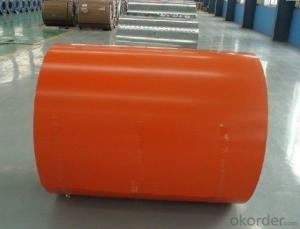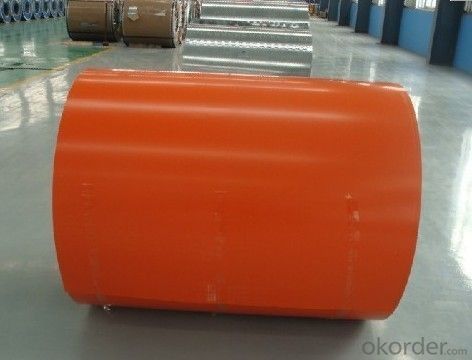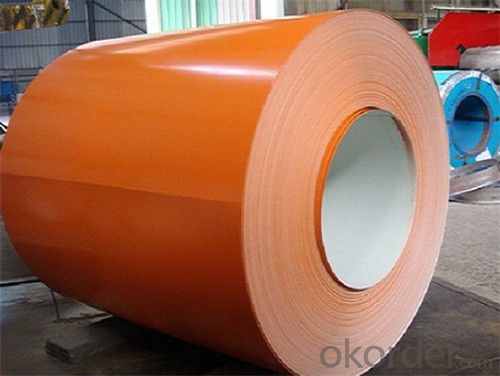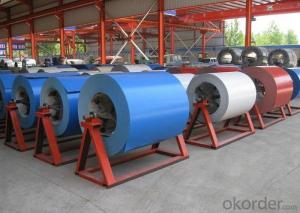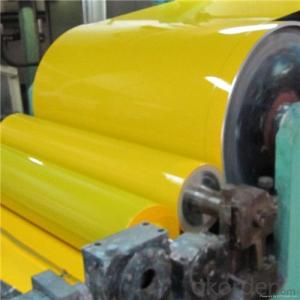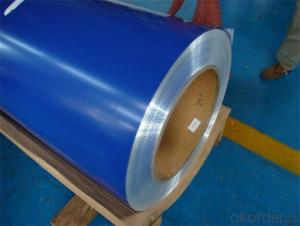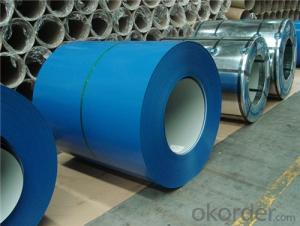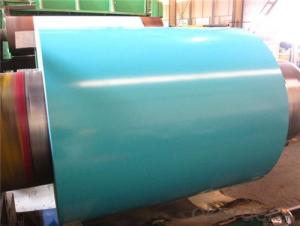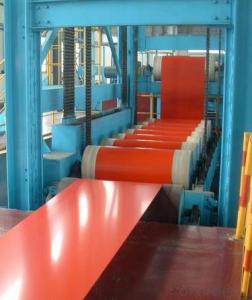Prepainted Rolled steel Coil for Construction Roof
- Loading Port:
- Shanghai
- Payment Terms:
- TT OR LC
- Min Order Qty:
- 50 m.t.
- Supply Capability:
- 30000 m.t./month
OKorder Service Pledge
OKorder Financial Service
You Might Also Like
Structure of Aluminum Zinc Rolled Coil
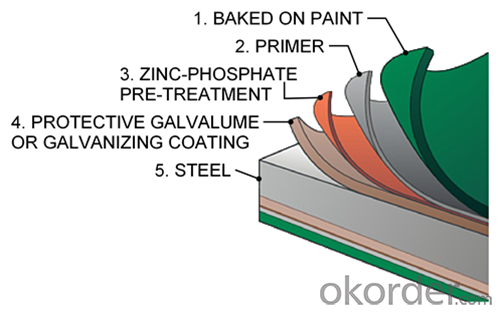
Description of Aluminum Zinc Rolled Coil
Aluminum zinc coils is a kind of coated steel coil/sheet. With the cold rolled steel of different strength and thickness as substrate, it is produced through applying Al-Zn coat on both faces by hot dip process. In its coating, Al accounts for about 55%, Si 1.6%, while the remaining is Zn. Aluminum zinc coils enjoys both the physical protective feature and durability of Al and the electrochemical protective property of Zn. And its surface has bright silver color and regular embossed-like figure, which are highly decorative.
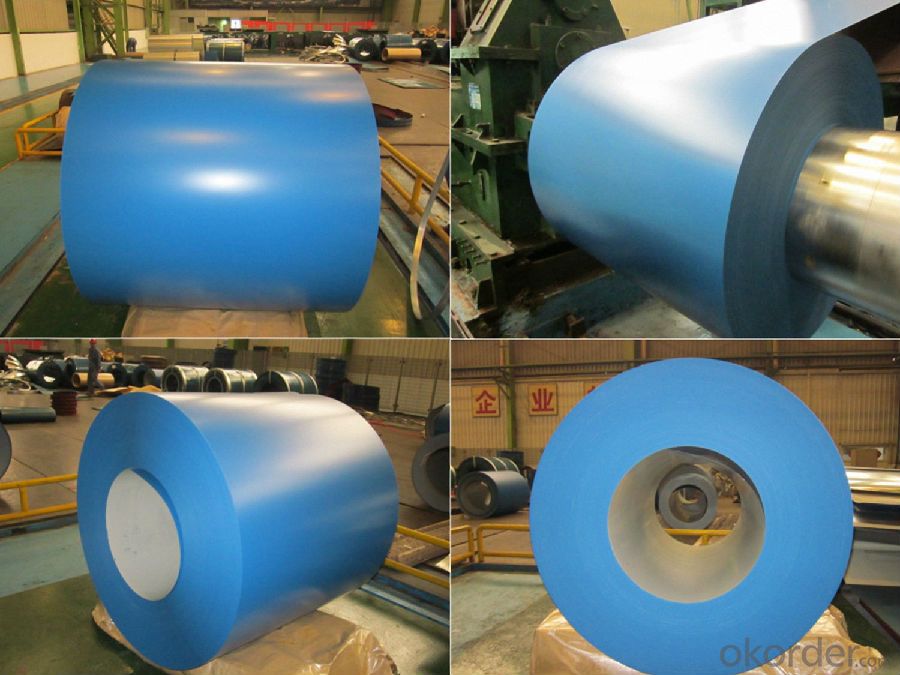
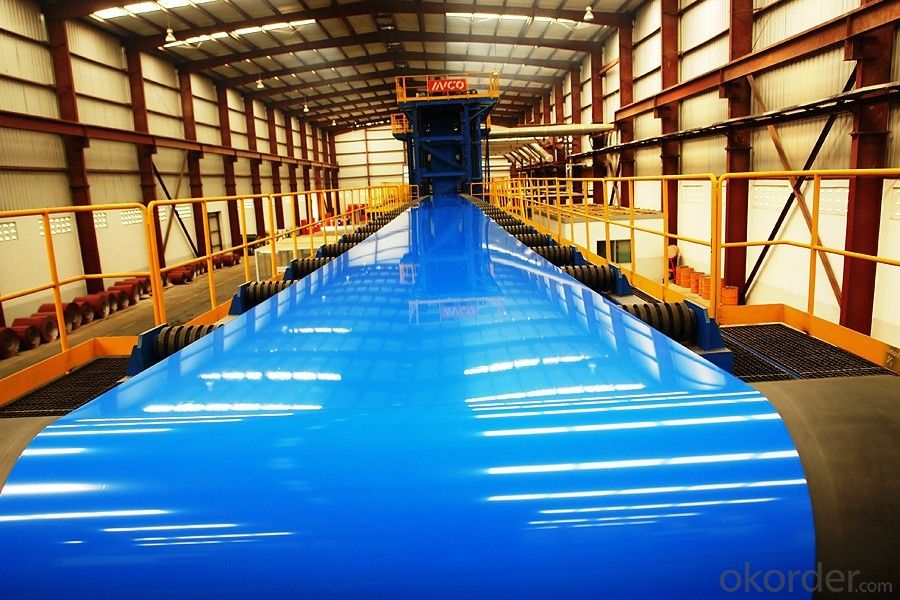
Main Feature of Aluminum Zinc Rolled Coil for Construction Roof
1.Corrosion resistance: It mainly depends on the aluminum protection. When the zinc being worn, the aluminum will form a dense layer of aluminum oxide, resist corrosion material to prevent further corrosion inside.
2. Heat resistance: Aluminum zinc alloy steel sheet has excellent heat resistance, can withstand high temperatures over 300 centigrade, and is similar with aluminized steel high temperature oxidation resistance. It often used in chimney pipes, ovens, fluorescent lighting device and the device cover.
3. Heat reflective: Galvanized steel plate heat-reflective high rate is twice as galvanized steel, often used to make insulation materials.
4. Economy: Because density of 55% AL-Zn is smaller than the density of Zn, so in the same weight and thickness of Galvanized zinc layer, aluminum-zinc steel plate is larger area more than 3% of galvanized steel sheet.
Applications of Aluminum Zinc Rolled Coil for Construction Roof
1. Construction and building: roofing; ventilating duct; handrail; partition panel;etc.
2. Electric appliance: refrigerator; washing machine; refrigerator; DVD;etc.
3.Transportation: oil tank; road sign; etc.
4.Agriculture:barn; etc.
5.Others:vending machine; game machine; etc.
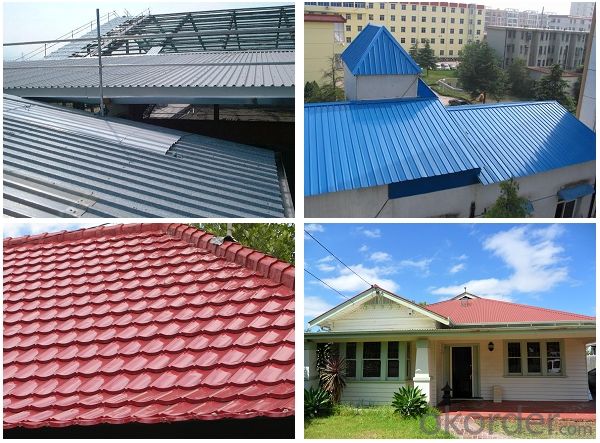
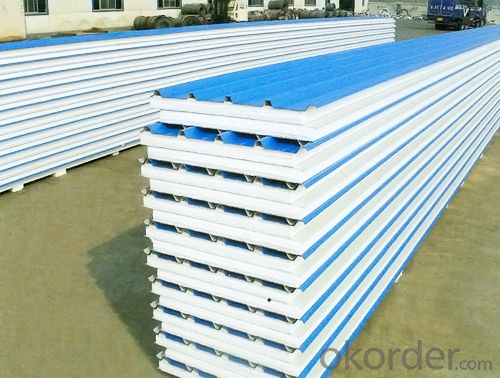
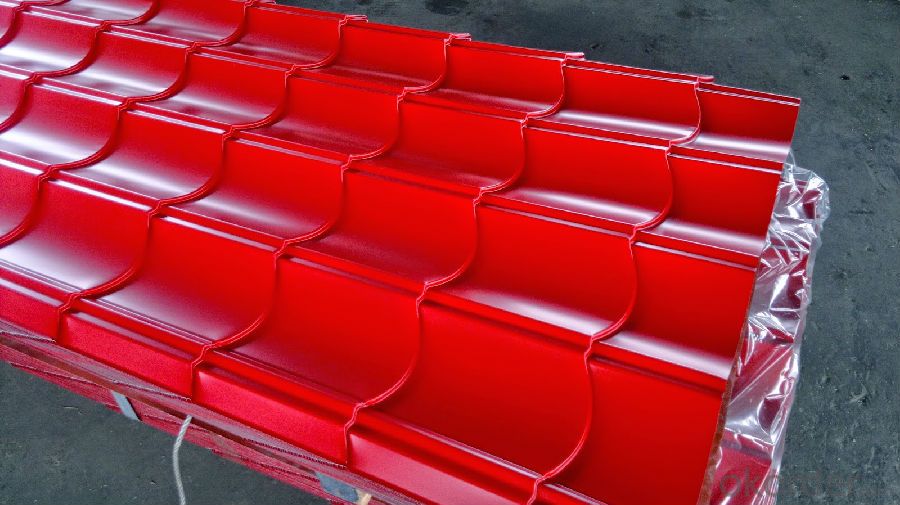
Specifications of Prepainted Aluminum Zinc Rolled Coil for Construction
Product | Hot Dipped Galvanized Steel Coil / Galvalume /Aluzinc Steel coil |
Material Grade | SGCC / SGCH / DX51D+AZ, etc |
Thickness | 0.2-3.0mm |
Width | 600-1500mm |
Tolerance | Thickness: +/-0.02mm , Width:+/-2mm |
Zinc-coating | AZ40-150g/m2 |
Technique | Raw material: Hot rolled steel coil --> Cold rolled_>hot dipped galvalume |
Surface | Dried, Chromated, Unoiled |
Spangle | Regular spangle , small spangle, zero spangle |
ID | 508MM |
Coil weight | 10MT max |
Export package | Cardboard inner sleeves, Waterproof paper, galvanized steel covered and steel strip packed |
FAQ of Prepainted Aluminum Zinc Rolled Coil for Construction
We have organized several common questions for our clients,may help you sincerely:
1. What is the minimum order quantity ?
Our MOQ is 50mt for each size. And we will consider to give more discount if you make big order like 1000 tons and more. Further more, the more appropriate payment term your offer the better price we can provide.
2. How long can we receive the product after purchase?
Usually within thirty working days after receiving buyer’s advance payment or LC. We will arrange the factory manufacturing as soon as possible. The cargo readiness usually takes 15-25 days, but the shipment will depend on the vessel situation.
3. How to guarantee the quality of the products?
We have established the international advanced quality management system,every link from raw material to final product we have strict quality test;We resolutely put an end to unqualified products flowing into the market. At the same time, we will provide necessary follow-up service assurance.
- Q: What are the common applications of stainless steel coils?
- Stainless steel coils have a wide range of applications due to their unique properties and characteristics. Some of the most common applications of stainless steel coils include: 1. Automotive industry: Stainless steel coils are widely used in the automotive industry for various components such as exhaust systems, mufflers, and catalytic converters. The corrosion resistance and durability of stainless steel make it an ideal choice for these applications. 2. Construction industry: Stainless steel coils are extensively used in the construction industry for structural elements, roofing, cladding, and facades. Its high strength, resistance to corrosion, and aesthetic appeal make stainless steel a popular choice for architectural projects. 3. Kitchen appliances: Stainless steel coils are commonly used in the manufacturing of kitchen appliances such as refrigerators, stoves, ovens, and dishwashers. The easy cleanability, resistance to heat and stains, and hygienic properties of stainless steel make it a preferred material for these applications. 4. Food processing industry: Stainless steel coils are widely used in the food processing industry for equipment such as tanks, pipes, and conveyor systems. The corrosion resistance and easy cleanability of stainless steel ensure the integrity and hygiene of food products. 5. Medical industry: Stainless steel coils find extensive use in the medical industry for various applications such as medical devices, surgical instruments, and implants. The biocompatibility, strength, and resistance to corrosion make stainless steel an ideal material for these critical healthcare applications. 6. Energy sector: Stainless steel coils are used in the energy sector for applications such as heat exchangers, boilers, and pipelines. The high-temperature resistance, excellent mechanical properties, and corrosion resistance of stainless steel make it suitable for these demanding applications. 7. Chemical industry: Stainless steel coils are employed in the chemical industry for storage tanks, piping systems, and reactors. The corrosion resistance and ability to withstand high temperatures and aggressive chemicals make stainless steel coils a reliable choice for handling various chemical substances. 8. Manufacturing industry: Stainless steel coils are used in a wide range of manufacturing processes such as stamping, forming, and fabrication. The versatility, durability, and ease of machining of stainless steel make it a popular choice for various industrial applications. Overall, the common applications of stainless steel coils are vast and varied, thanks to their exceptional properties like corrosion resistance, strength, durability, and aesthetic appeal.
- Q: I have one and wonder how much force this can take since it does seem like you can bend it(Sure it's impossible with hands), but I don't want to try that cause i don't want to break it. Many people say that it's really hard and can handle a hammer smash? is that true and can it even make it through more force. Cause steel is harder than iron and iron is pretty hard... So how much can i trust this locks security, i mean if i put at at a door would some thiefes be able to break it, if they had the right tools??
- It's hard to give you a quantitative answer. There are different grades of testing standards for padlocks. It comes under the ASTM F883. You need to be more specific. The link only gives a picture and no details about the lock. But in general, stainless steel locks are pretty darn strong. Also, you are under the wrong impression about steel vs iron. Iron is a component of steel. Pure iron is very ductile and is softer than steel. Cast iron, is very hard, but is also very brittle and has limited uses. In general, mild steel is realitively soft and ductile. But, there are many different alloys of steel and some have hardnesses and strengths higher than cast iron. Stainless steel is typically more ductile that mild steel because of the smaller amount of iron in the recipe. There are exceptions to that as well. The 400 series of stainless steels have higher amounts of iron and can be heat treated to hardnesses equaling the better steel alloys.
- Q: Hi All,I was wanting to know,on the quality bikes such as Trek,Giant etc is the aluminum frames as strong as the steel frame bikes? I have heard conflicting reports on this,so thought I would ask here for more input.Thanks!
- Dustin You are close, but not quite right. Steel is a great frame material, It can be heavier than its aluminum counter part, But, steel often provides a much nicer ride. Aluminum tends to be a very stiff and rigid ride that many do not like. I have had frames made of all materials. I can say that I have never met a frame material that I did not like. Check the weight of the frames you are looking at. If there is more than two pound (or so) difference then the aluminum frame would be my choice. Soccerref
- Q: How are steel coils processed for specific applications?
- Steel coils go through a series of meticulously planned steps to be processed for specific applications. The process commences with the selection of the appropriate steel grade and thickness, which is based on the requirements of the end application. Upon receiving the steel coils, they undergo a series of processing steps to transform them into the desired product. The first step in processing steel coils is referred to as uncoiling, where the coil is unwound and straightened to ensure it is flat and ready for further processing. Next, the uncoiled steel is cleaned to eliminate any dirt, oil, or rust on the surface. This is typically done through pickling, a process that involves immersing the steel in an acid bath to remove impurities. Once cleaned, the steel undergoes various shaping processes depending on the desired application. This can involve slitting, where the coil is cut into narrower strips, or shearing, where it is cut into specific lengths. These shaping processes often require specialized machinery capable of handling the high strength and thickness of the steel. After shaping, the steel may undergo additional processes to enhance its properties. For instance, it can be heat treated to increase strength or hardness, or it can go through a coating process to improve corrosion resistance. Coating techniques can include galvanizing, where a layer of zinc is applied to the steel, or painting, where a layer of paint is added. Finally, the processed steel coils are inspected for quality and undergo any necessary finishing processes. This can involve trimming the edges to remove irregularities, or applying protective coatings to prevent damage during transportation or storage. In conclusion, processing steel coils for specific applications is a complex and carefully controlled process. It involves a combination of shaping, cleaning, coating, and finishing processes to ensure that the steel meets required specifications and is suitable for use in various industries such as automotive, construction, and manufacturing.
- Q: How are steel coils used in the production of electrical transmission poles?
- Steel coils are used in the production of electrical transmission poles as the primary material for constructing the pole itself. The steel coils are typically cut and shaped into the desired dimensions, then welded together to form the pole structure. This provides strength, durability, and stability to withstand the load and environmental conditions associated with electrical transmission lines.
- Q: How are steel coils used in the production of electrical transmission towers?
- Steel coils are used in the production of electrical transmission towers as they are shaped and welded to create the structural framework of the towers. The coils are unrolled, cut, and formed into the required shape, providing strength and stability to support power lines and equipment.
- Q: What are the advantages of using steel coils?
- There are several advantages of using steel coils. Firstly, steel coils are highly durable and can withstand extreme conditions, making them suitable for various applications. Secondly, they provide excellent strength and stability, making them ideal for structural purposes. Additionally, steel coils can be easily molded into different shapes, allowing for customization and versatility in design. Moreover, steel coils have a high recycling rate, making them an environmentally friendly choice. Finally, steel coils offer cost-effectiveness due to their long lifespan and low maintenance requirements.
- Q: I work at a tool store. I told my boss last week we needed more pruning shears so he did get more of all kinds. Thing is out of all of the shears he brought Two of different kinds say they are made out of Japanese steel. I have never heard of Japanese steel so now i ask you (the public) whats the difference between it and steel from the US or any other country? Those shears are worth more then the ones he gets from Mexico and China and even more than Black and Decker, Fiskars, etc but not more then Corona brand ones.
- Well Japan, with democracy and code standards, would be better than China or Mexico, with poorly paid workers and poor standards and poor quality. I don't know why or if its better quality than US steel
- Q: How are steel coils used in the production of metal roofing panels?
- Steel coils are a critical component in the production of metal roofing panels. These coils, which are rolled sheets of steel, play a crucial role in shaping and forming the panels. To start with, the steel coils are unwound and fed into a machine called a roll former. This machine uses a series of rollers and dies to gradually shape and bend the steel into the desired profile of the metal roofing panel. The coils pass through these rollers, which apply pressure and force to mold the steel into the required shape and size. Once the metal has been formed into panels, it may undergo additional processes to enhance its durability and appearance. This can include galvanizing or coating the panels with various protective layers to prevent corrosion and improve weather resistance. These additional steps help to ensure that the metal roofing panels are able to withstand harsh environmental conditions and provide long-lasting performance. Steel coils are preferred in the production of metal roofing panels due to their strength and durability. Steel is known for its exceptional strength-to-weight ratio, making it a suitable material for roofing applications. Additionally, steel is highly resistant to various weather conditions, including high winds, heavy rains, and extreme temperatures. This makes it an ideal choice for roofing panels that need to withstand the elements and provide reliable protection for buildings. Overall, steel coils are an essential component in the manufacturing process of metal roofing panels. They are used to shape and form the panels, which are then further processed to enhance their durability. The use of steel in these panels ensures that they can withstand harsh weather conditions and provide long-lasting performance for residential, commercial, and industrial buildings.
- Q: What are the challenges in welding steel coils?
- In order to guarantee successful and high-quality welds, it is necessary to address various challenges encountered when welding steel coils. One primary challenge involves achieving appropriate joint preparation. Steel coils often exhibit different surface conditions, such as rust, scale, or oil, which must be cleaned or eliminated before welding. This demands extensive cleaning and preparation to establish a clean and reliable welding surface. Another challenge lies in controlling the heat input. Due to the thin nature of steel coils, excessive heat can result in distortion, warping, or even burn-through. Welding operators must exercise careful control over the heat input to prevent such issues and uphold the integrity of the coils. Additionally, the presence of residual stresses poses a significant difficulty. Steel coils typically endure various stresses during the manufacturing, transportation, and handling processes, which can lead to distortion or cracking during welding. To mitigate these stresses and prevent potential defects, sufficient preheating and post-weld heat treatment may be necessary. Ensuring proper weld penetration is also of utmost importance. Steel coils often possess varying thicknesses, making it challenging to achieve consistent and adequate weld penetration throughout the joint. Welding operators must select appropriate welding parameters and techniques to guarantee complete fusion and a robust bond. Lastly, the size and weight of steel coils can create logistical challenges during welding. Specialized equipment and precise positioning are required to handle large and heavy coils, ensuring safe and efficient welding. Additionally, the length of the coils may necessitate multiple passes or continuous welding, demanding skilled operators and meticulous coordination. In conclusion, welding steel coils necessitates careful attention to joint preparation, heat control, stress relief, weld penetration, and logistical considerations. Overcoming these challenges guarantees the production of welded steel coils that are of high quality and durability.
Send your message to us
Prepainted Rolled steel Coil for Construction Roof
- Loading Port:
- Shanghai
- Payment Terms:
- TT OR LC
- Min Order Qty:
- 50 m.t.
- Supply Capability:
- 30000 m.t./month
OKorder Service Pledge
OKorder Financial Service
Similar products
Hot products
Hot Searches
Related keywords
